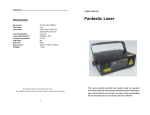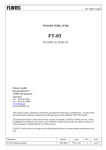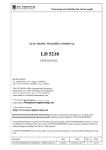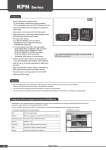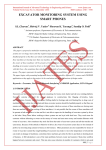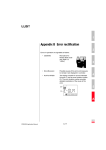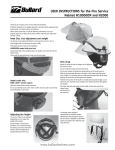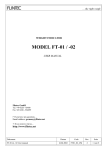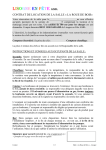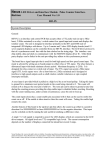Download TECHNICAL -REFERENCE MANUAL
Transcript
Vishay Transducers REMOTE DISPLAY TERMINAL VT150 TECHNICAL -REFERENCE MANUAL Document VT150 MANUAL Date Code Rev. Page 13.02.05 VT150UM 1 1 of 23 Vishay Transducers TABLE OF CONTENTS PAGE 1. INTRODUCTION 3 2. FRONT PANEL DESCRIPTION 4 INSTALLATION 6 6 6 6 3. 3.1. 3.2 3.3. 4. MOUNTING WIRING AC POWER OPERATING MODES VT150 CONFIGURATION DJB CONFIGURATION CUSTOM PRINT FORMATS 7 7 7 7 8 8 9 9 11 15 6. FUNCTION MENU 16 7. ERRORS 18 8. COMMUNICATIONS 19 4.1 4.2 4.3 4.4 4.5 5. REMOTE DISPLAY (Continuous weight input) MASTER DISPLAY AND KEYBOARD FOR DJB SLAVE DISPLAY FOR DJB DUAL DJB MASTER MODE ( Scale A/B ) DUAL CHANNEL DWI MASTER MODE SETUP AND CALIBRATION 5.1. 5.2 5.3 8.1 8.2 9. SERIAL PORT 1 SERIAL PORT 2 SPECIFICATIONS 9.1 9.2 23 MAINTENANCE SERVICE Document VT150 MANUAL Date Code Rev. Page 13.02.05 VT150UM 1 2 of 23 Vishay Transducers 1. INTRODUCTION VT150 is a Remote Display Terminal specifically designed for use as remote weight indicator for Digital Junction Box weigh systems (VTDJB). The unit maybe operated in the Master mode where it will poll all (max 63) VTDJB’s connected to it, or in the Slave mode where it will only display information from a selected VTDJB. Setup and Calibration of VTDJB’s is performed via VT150 in the Master mode. When several VTDJB’s and VT150’s are connected on one cable, only one VT150 is allowed to poll the VTDJB’s. Communication in a master/slave network is based on MSP serial interface protocol. The unit may also be used as remote display for numeric indicators with continuous weight output mode. VT150 may be used for legal for trade applications when connected with one or more weigh scales, since calibration data is stored in the VTDJB. The basic configuration includes: 1. Serial port RS485A with network capability. 2. Front panel with 6 digit LED display plus 5 annunciators and 6 membrane keys. 3. Non volatile memory for system parameters and calibration data. 4. The setting of the unit is done through a guided keyboard operation, enabling the adaptation to operating environment and system requirements. Two setup procedures are executed. Fn 49 for calibrating the VTDJB and Fn 46 for setting up operation mode and communication parameters of VT150. 5. Real time clock calendar with rechargeable battery backup. 6. Serial port RS232 adapter for printing weighing data on a serial printer and /or bidirectional communication with a host computer. 7. Non volatile memory for storage of 10.000 weights (electronic tally roll or Alibi memory). OPTIONS OP.5 230 VAC to 9 VAC/ 500mA, mains power adapter. OP.7 RS232C/RS485A converter including power adapter 230 VAC to 8 VAC/ 500mA. OP.8 Bracket (Table top Wall mount) for the panel version. OP.9 Custom software on request. ENCLOSURES P S Document VT150 MANUAL Panel mount 72 x 144 x 70 mm Stainless steel 180 x 108 x 60 mm. Date Code Rev. Page 13.02.05 VT150UM 1 3 of 23 Vishay Transducers 2. FRONT PANEL DESCRIPTION 1. WEIGHT DISPLAY 6 digit LED for the display of measured weight (gross or net), and error messages. Digit height approx. 14mm. OVERARANGE is indicated by vvvvvv UNDER-RANGE is indicated by uuuuuu Scale not level will be indicated by E tilt 2. NET INDICATOR If lights up when the scale has been tared and the display is in NET mode. 3. TARE INDICATOR It indicates that a tare value is being displayed. 4. NO MOTION INDICATOR It lights up when the scale is stable. 5. CENTER OF ZERO INDICATOR It lights up when the scale weight is stable and within 1/4 division of actual zero. 6. SCALE A INDICATOR In ‘dual scale mode’ it indicates the weight from scale A is displayed. ON = Scale A is displayed OFF = Scale B is displayed 7. SCALE B INDICATOR In ‘dual scale mode’ it indicates the weight from scale B is displayed. ON = Scale B is displayed OFF = Scale A is displayed When both scale A & B LEDs are illuminated the sum of the weight A+B is displayed. Document VT150 MANUAL Date Code Rev. Page 13.02.05 VT150UM 1 4 of 23 Vishay Transducers O 8. T - 9. - I 10. - ZERO / CLEAR ERROR / ESCAPE KEY It is used to reset the weight display to zero. Zeroing will be effective only if the scale is stable, in gross mode, and the weight is within + 2% of max weighing capacity. If an error is present on the display press this key to acknowledge. TARE KEY (toggle) It is used to tare the scale. Taring will be effective only if the scale is stable and within the weighing capacity. If the scale has already been tared depression of the key will cause the tare to be cancelled and the weight display to return to Gross mode. TARE RECALL KEY Pressing this key will cause the tare memory to be displayed briefly. In “DUAL SCALE” mode the key switches between scale A or scale B or SUM (A+B). P 11. PRINT - ACCUMULATE It is used to transmit weight data to peripheral devices via the serial port 1. The transmitted weight will also be accumulated. The weight will be printed only if it is stable and within the weighing range of the indicator. Printing and / or accumulation will take place only if enabled in set up. The weight data printed is selectable in SET UP 2. 2t. Refer to the technical manual for details. 12. Y TOTAL KEY It is used to display the current accumulated total. Press Y again to see the number of weighings. Press Y again to end the total display or Press P to print/delete the total. 13. A FUNCTION KEY Enables a selection of software utilities 00 – 99. Fn 00 appears on the display. Use keys I to increment the flashing digit, T to change digit. When the correct number is displayed press P. The selected function will be activated. Refer to chapter 6 Function menu for details of available utilities. Document VT150 MANUAL Date Code Rev. Page 13.02.05 VT150UM 1 5 of 23 Vishay Transducers 3. 3.1. INSTALLATION Mounting The mounting location must be such that the instrument is not subject to excessive vibrations, heat or humidity. Avoid direct sunlight on the front of the instrument. The unit has to be installed at the right height to allow an easy reading of the display and keyboard operation. 3.2 Wiring Use 4 x 0,34 mm2 screened for RS232C connection and 2x0,34 mm2 twisted pair and shielded for RS485A connection. PANEL MOUNT All connections to the instrument are made through the rear panel connector. Strain relieves are supplied with the connectors. See connector diagram in Annex A. STAINLESS STEEL -Remove the rear panel by undoing the 4 screws. Lift the rear panel carefully. -Insert cables via the cable glands. Strip and connect the power leads to J1, the RS485 leads to J2 and RS232 leads to J3. (See connector diagram in Annex A). Connect the shields of the cables on the ground tag provided. -Re-install the rear panel. Tighten the screws until the rear panel touches the front panel. -Tighten the strain relief’s to ensure a firm grip on the cables. 3.3. Power As the instrument is computer controlled it requires clean power for reliable operation. Power supplied should come from a source that is isolated from other process equipment. A main adapter of 7,5 – 10VAC/500 mA is recommended for operation of both the VT150 and VTDJB. 3.4 Power up When the unit is powered up it goes through a series of self tests after which the following is displayed in sequence. Version code Revision date All display segments are turned on then off for 1 sec. Then it goes into the operating mode. If an error is encountered it will be displayed in the form E xx . Refer to chapter 7 Errors for details. CAUTION : Document VT150 MANUAL Do not run signal cables together with power cables. Connect the shielding where indicated on the drawing only. Never use a megger to check wiring. Be sure the AC power socket outlet is properly protected. For optimum EMC performance, keep the length of shield inside the enclosure as short as possible. Date Code Rev. Page 13.02.05 VT150UM 1 6 of 23 Vishay Transducers 4. OPERATING MODES VT150 may be configured according to the applications, to be operated in 5 different modes. 4.1 REMOTE DISPLAY - CONTINUOUS WEIGHT INPUT The unit displays information received from the serial port(s) according to (P + 123.45 “CR”) format. RS485A may be received from port 1. Baud rate and data bits are programmable in SETUP 3. RS232C may be received from port 2. Baud rate is fixed at 1200 baud. No or even parity and 7 or 8 data bits are programmable in SETUP 2. 20 mA , current loop passive may be connected to the RS232 port (Tx+ to Tx and Tx– to Rx). SET UP 1 2 3 REQUIREMENTS (Port 1 9600, E, 7, 1 or Port 2 1200, E, 7, 1) Don’t care 2d = 17, the rest set to Zero 3t = 01, 3b = 96, 3d = 17 Upon power up a search is performed by the unit for input data from each serial port. If data is input from port 1 it will be displayed. Else it will search port 2. If no data is received by any port E30 will be displayed until data reception is restored. DO NOT CONNECT BOTH PORTS SIMULTANEOUSLY. 4.2 MASTER DISPLAY & KEYBOARD FOR DJB(S) In this mode of operation the VT150 polls the VTDJB(s) and displays their data. Commands such as “Zero”, “Tare” etc. are issued to the VTDJB via the VT150’s keyboard. Calibration of the VTDJB is also possible through a dialogue in the VT150. A number of VTDJBs may be connected in a network with one VT150 acting as the master. The VTDJB address whose data is displayed, is keyboard selected with Fn 01 to Fn 30 corresponding to VTDJB A to ^. The default address is A ie the first VTDJB in the network. SETUP 1 2 3 REQUIREMENTS (9600, E, 7, 1, VTDJB address A, Nr of VTDJBs = 4) Application dependent Application dependent 3t = 02, 3b = 96, 3d = 17, 3.n = 4, 3E = 65. The VT150 always polls VTDJBs in sequence, starting from address A and increments the address until the programmed number of VTDJBs (set up 3.n) where it circles back to A. The cycle is repeated as long as the VT150 is in the weight display mode. Polling is paused while in the function menu or printing etc. The selected (Fn 01 to Fn 30) VTDJB may displayed or calibrated via the VTDJB calibration procedure in the VT150 while all VTDJBs are polled. This however limits the response time of the selected VTDJB. Refer to chapter 5 for details of set up and calibration procedures. 4.3 SLAVE DISPLAY FOR VTDJB The unit is connected in a VTDJB network. VTDJB unit(s) are scanned by a master unit which may be a personal computer or another VT150. The slave VT150 will display all data (weight and messages) originating from the VTDJB with the same address. Document VT150 MANUAL Date Code Rev. Page 13.02.05 VT150UM 1 7 of 23 Vishay Transducers SETUP 1 2 3 REQUIREMENTS (9600, E, 7, 1, VTDJB address A) Don’t care Don’t care 3t = 03, 3b = 96, 3d = 17, 3E = 65, the rest don’t care. Keyboard operation is normal except that no commands are transmitted to VTDJB’s and printing or totalizing is inhibited. The unit may display data from any of 30 VTDJBs in a network the selection is performed by Fn 01 to Fn 30 corresponding to VTDJB address A to Z (41h to 5Eh). Only polled VTDJBs are displayed, so the master in the network must have been set up to poll all VTDJBs, accordingly. The master may poll the addressed VTDJB units sequentially or in any order of frequency. The VT150 will pick up the selected VTDJB data and display it. 4.4 DUAL VTDJB MASTER MODE (SCALE A/B) The VT150 polls two VTDJBs A and B connected to loadcell scales. The unit may display the weight from scale (A) or from scale (B) or the sum of the two weights (A+B). Individual scale weights or the sum of the two may be printed or totalized or transmitted to PC. If scale A or scale B is selected the operation is normal single scale where the display and keyboard operate for this scale only. If (A+B) is selected display and keyboard operation is similar but with few specific limitations. Selection of A or B or A+B is performed by key I and is indicated in the front panel by the Annunciators V1 V2 . (A+B)=Both illuminated. The (A+B) mode has the following operational characteristics: If any of the two scales is out of range the (A+B) is out of range. For the “NO MOTION” condition both scales must be stable. For the :CENTER OF ZERO” condition both scales must be within 0,25 division. Switching to Net mode is supported provided both scales are in Gross or Net mode. If any of the scales is in NET mode it will automatically be switched to GROSS mode. If any of the VTDJBs displays a message instead of weight, this message will be displayed on the VT150. The Fn key is not operational in (A+B) mode. For approved scales if A+B mode is used the scales must have the same display step. Document VT150 MANUAL Date Code Rev. Page 13.02.05 VT150UM 1 8 of 23 Vishay Transducers 5. SET UP AND CALIBRATION The chapter refers to both the VT150 and the VTDJB setting up. The VTDJB is configured with Fn 49 procedure. The VT150 is calibrated with Fn 46 procedure. For setup and calibration of the VTDJB the unit must have been connected and the correct communication protocol installed in both the VTDJB and VT150. It is advisable to leave the default settings [ (9600, E, 7, 1) , address A]. If there is no communication perform Fn 33 to “auto tune” the VT150 to the VTDJB communication speed and address code. In the setup dialogue the following two numeric scroll edit procedures are used. 1. SCROLL I = DISPLAY NEXT SELECTION P = ACCEPT DISPLAYED VALUE 5.1 2. NUMSCROLL EDIT T= SELECT DIGIT (CYCLIC) I = INCREMENT FLASHING DIGIT P = ACCEPT DISPLAYED NUMBER VT150 CONFIGURATION To enter the configuration procedure of VT150 press a . The display shows Fn 00. Use “NUMSCROLL EDIT” until the display shows Fn 46, then press P . Display shows SETUP . Press I to step through SETUP, STORE, INIT dialogues. Press O key to exit the menu or press P to enter the displayed item. SETUP SUBMENU. Press I to scroll through SETUP 1, SETUP 2, Press P to enter the displayed dialogue. SETUP 3, SETUP 1 (OPERATIONAL PARAMETERS). 1.1 Totalizing memory 0 = No 1 = Yes 1.2 Alibi memory 1.3 1.4 1.5 1.6 Reserved Date format Reserved Real time clock & ram totaliser 1.7 1.8 1.t Reserved Reserved Display off timer SETUP. Enables the totalizing of printed weights. enables the electronic tally roll. (B only)(see chapter 4.2 & 4.4) 0 = No 1 = Yes 0 = d-m-y 1 = m-d-y 0 = No 1 = Yes Enables date time and totalizing in battery backed ram. (B only) 00-99 minutes 00=Disabled. Time for the display to turn off automatically if the weight is zero and no key is pressed. SETUP 2 (SERIAL PORT 2 / PRINT PARAMETERS) 2.t PRINT TYPE : 00 PORT DISABLED. 01 TICKET PRINTOUT (Date, time, Nr, weight). 02 CONTINUOUS TRANSMISSION OF WEIGHT. 05 TICKET GROSS, TARE, NET, (quadruple size). 06 SINGLE LINE NUMBER AND GROSS, TARE, NET. 09 HOST COMPUTER MODE. Document VT150 MANUAL Date Code Rev. Page 13.02.05 VT150UM 1 9 of 23 Vishay Transducers 20 2.d 2.E 2.L 2.r 2.A 2.F 2.1 2.2 2.3 2.4 2.5 2.6 2.7 2.8 CUSTOM PRINTS . Format 1 in Gross (Max 512 b). Format 2 in Net (Max 512 b). DATA BITS SERIAL CHANNEL 1 17 = 7 data bits / even parity 08 = 8 data bits / no parity ADDRESS OF VT150 (A-Z) PAGE LENGTH Ticket length in linefeeds PAPER REVERSE Number of reverse linefeeds before printout LEFT MARGIN Number of spaces from left margin PAGE HEADER Number of linefeeds before printout RESERVED RESERVED PRINT BELOW / 0=NO 1=YES Printing is inhibited if the weight is less than MIN. CAPACITY min (20 scale division) and the display show Lo CAP briefly. RESERVED RESERVED WAIT UNLOAD 0=NO 1=YES Inhibits further prints until the weight falls below min. PRINTER ERROR / 0=NO 1=YES Printer error or paper out will display Err 20 CONTROL and transmission will be inhibited. RESERVED SETUP 3 (SERIAL PORT 1 & MODE) 3.t MODE OF OPERATION 01 = Remote display for continuous weight input. Use I to select Instruments (LECW_2 protocol ie. P + 12.345 CR) and P to accept 02 = VTDJB mode – Master. Polls VTDJB’s connected and displays VTDJB data and proceed. 03 = DJB mode – Slave. Displays data from VTDJB. Polling of the VTDJB’s must be done by another Master (VT150 or PC). 04 = Dual VTDJB mode – Master. SCALE A/B. 05 = N/A. 3.b BAUD RATE 24 = 2400 baud 38 = 38400 baud Use I to select 96 = 9600 baud 57 = 57600 baud and P to accept 19 = 19200 baud 11 = 115 kbaud and proceed. 3.d DATA BITS & PARITY 08 = 8 data bits, no parity Use I to select 17 = 7 data bits, Even parity and P to accept 3.n NR OF POLLED VTDJB; Key in the number of connected VTDJB’s (decimal). (01 – 63) Polling always starts with address A (41h or 65d). 3.E DJB DISPLAY ADDRESS Use “DIGIT ENTRY” to key in the VTDJB address to be displayed (65 – 127) by the VT150 (decimal). DIALOGUE STORE (Save in EEPROM) Press P to permanently save all the calibration data. Program exits setup / calibration and reinitialises. (up to 100.000 storage cycles allowed). The data will be stored in the VT150 EEPROM. DIALOGUE INIT It initialises the VT150 to factory default values. Document VT150 MANUAL Date Code Rev. Page 13.02.05 VT150UM 1 10 of 23 Vishay Transducers SET UP 1 1.1 = 1 1.2 = 1 1.3 = 0 1.4 = 0 1.5 = 0 1.6 = 1 1.7 = 0 1.8 = 0 1.t = 00 5.2 SET UP 2 2.t = 01 2.1 = 0 2.d = 17 2.2 = 0 2.E = 65 2.3 = 0 2.L = 01 2.4 = 0 2.r = 00 2.5 = 0 2.A = 00 2.6 = 0 2.F = 00 2.7 = 0 2.8 = 0 SET UP 3 3.t = 02 3.b = 96 3.d = 17 3.n = 01 3.E = 65 VTDJB CONFIGURATION To enter the set up & calibration of VTDJB press A . The display shows Fn. 00 . Use “NUMSCROLL EDIT” until the display shows Fn 49, then press P . Display shows PAR . Use I to scroll through PAR , CAL , SETUP , INIT , STORE , PIN dialogues. While in the CAL menu, press I to select S-CAL or E-CAL submenus. A “CAL LOCK” (calibration lock hardware jumper inside the VTDJB), is provided , required by Weights & Measures Authorities so that calibration can be sealed. In addition to the “CAL LOCK” jumper an A.T.CNT (Audit Trail Counter) is provided for Weights & Measures Authorities to check if any calibration attempt has been made since the last inspection. The A.T.CNT (6 digits) is incremented when a weight parameter is changed, or a corner or scale calibration is attempted, regardless if the changes are saved in EEPROM or not. The position of the “CAL LOCK” jumper and the A. T. CNT number may be inspected with Fn 48(chapter 6). In addition a software PIN (personal identification number), logically OR connected is provided for the technical staff in order to avoid accidental scale calibration attempts. If the CALLOCK is inserted access to PAR, CAL, INIT menus is limited to read operations only. Any attempt to modify the metrological characteristics is denied and ERR 91 or ERR 33 is returned. If the PINLOCK is activated access is limited to PIN, STORE menus only. Use PIN dialogue to set / reset the pin lock. While displayed, each dialogue or submenu may be accessed with P. Press O to exit setup / calibration procedure. DIALOGUE PIN Enables activation or de-activation of the PINLOCK. Press I to scroll through Unloc , Loc . Unlock deactivates the PIN so that entry to setup and calibration menus is possible. However it does not override the hardware lock in the DJB. Press P to enter the displayed item. The display shows 000000. Key in the PIN number and press P . If the number entered was correct the display shows PASS briefly and returns to the calling menu. If the number entered was incorrect the display shows FAIL briefly and returns to the calling menu. The selected Lock or Unlock position is not automatically saved in EEPROM but following a subsequent STORE operation. (See Fn 40 for instructions on how to change PIN) After the calibration of the unit is completed return to PIN dialogue to lock. Document VT150 MANUAL Date Code Rev. Page 13.02.05 VT150UM 1 11 of 23 Vishay Transducers DIALOGUE Par (Scale Parameters of VTDJB) The dialogue PAR is used to select scale parameters. When PAR is selected VT150 uploads the parameters in use in the connected VTDJB.The parameters are defined as follows : 2.P 3.P 4.P 5.P 6.P = = = = = Position of decimal point (Nr of decimal digits). (0-4) Display resolution (1-50) Two first digits of weighing range (00-99) (0-4), (0-2 for VTDJB) Digital filter. (If entry is x then samples = 2x). A/D converter speed (1-4) 1 = 8 / n , 2 = 20 / n , 3 = 40 / n , 4 = 80 / n conversions per second. n = Nr. of load cells. The max. conversions per second can not exceed 40 for VTDJB. (1-7) 7.P = No motion samples. (If entry is x then samples = 2x). 8.1 = Autozero maintenance 0 = NO 1 = YES 8.2 = Autozero on power up 0 = NO 1 = YES 8.3 = Dual digital filter 0 = NO 1 = YES 8.4 = Reserved 8.5 = Reserved 8.6 = Leading zero blank 0 = NO 1 = YES 8.7 = Reserved 8.8 = N/A 0.P = Dual interval (00-99) The first two digits of the weighing range for which the lower display division will be selected automatically. 00 = Dual interval not active. GAIN = Loadcell amplifier adjustment 0 = 2 mV/V 1 = 4 mV/V LCNR = Nr. of loadcells connected (1–4) Upon exit from PAR, the new parameters are downloaded automatically to the connected VTDJB, but not saved in non volatile memory. The calibration audit trail counter will be incremented. MENU CAL (Scale calibration of VTDJB) Used for Zero, Span calibration and “corner” correction. Press P to enter the menu. Press I to scroll through S-CAL, E-CAL, CAL . Press P to enter the displayed dialogue. If the scale is calibrated for the first time or a loadcell is changed the sequence Corner, Zero, Span should be followed. Subsequent calibration may include only Zero or Zero and Span. Be aware that CAL does not automatically save the calibration constants in non volatile memory. It must be done by the user with the STORE dialogue. DIALOGUE S-CAL (Standard Calibration of VTDJB with weights) Display shows CORNER Press I to scroll through ZERO, SPAN , CORNER or press O to exit to S-CAL. Press P to enter the displayed dialogue. CORNER CORRECTION (Scale corner adjustment) Display shows E Scl . Make sure that the scale is empty and press P . The display shows WAIT… for about 15 sec . Then it shows CORNER.1 . Place test weight in CORNER.1 and press P. The display shows WAIT… for about 15 sec . Then it shows CORNER.2 . Document VT150 MANUAL Date Code Rev. Page 13.02.05 VT150UM 1 12 of 23 Vishay Transducers Place test weight in CORNER.2 and press P. The display shows WAIT… for about 15 sec . Then it shows CORNER.3 . Place test weight in CORNER.3 and press P. The display shows WAIT… for about 15 sec . Then it shows CORNER.4 . Place test weight in CORNER.4 and press P. Press P to proceed. If there is an error (insufficient resolution, wrong corner) the dialogue does not proceed to the next corner. As the corner adjustment is done with internal resolution a 10% of capacity corner load is sufficient. However observe weights and measures regulations on eccentric loading. ZERO CALIBRATION (Dead load adjustment) Press P to enter the dialogue. The display shows E SCL (Empty Scale). Press P to balance the dead load or press O to exit to S-CAL. The display shows WAIT… for about 5 sec and then it zeroes. Press I to exit to S-CAL menu. SPAN CALIBRATION to go to Zero or press O to exit to S-CAL. Display shows SPAN. Press I Press P to enter the dialogue. Place the calibration weight on the platform. Display shows C xxxxx where xxxxx = Maximum capacity of scale. Enter the calibration weight already on the platform, using the NUMSCROLL EDIT procedure . The display shows WAIT… for about 5 sec. , then the calibration weight. Repeat the SPAN procedure if the calibration is not accurate. Press O to exit to SPAN. Press I twice to exit to CAL. E-CAL DIALOGUE (Electronic calibration of VTDJB with mV/V from loadcell data sheets) Display shows CORNER. Press P to calibrate corners. Display shows 000000 . Enter the rated output (in mV/V) of loadcell in corner 1. (Example : If R. O of Loadcell 1= 1,9793 mV/V then enter 019793). The display shows CORNER.2 . Press P . Enter the rated output (in mV/V) of loadcell in corner 2. The display shows CORNER.3 . Press P . Enter the rated output (in mV/V) of loadcell in corner 3. The display shows CORNER.4 . Press P . Enter the rated output (in mV/V) of loadcell in corner 4. Display shows WAIT… for about 5 sec. Then it shows weight. Press O . Display shows CORNER. Press I . Display shows ZERO. Press P . Enter the overall mV/V of the dead load. (Load cell zero balance + scale dead load). Display shows WAIT… and then it displays weight. Press O then I . The display shows SPAN. Press P . The display shows C xxxxx . Enter the rated capacity of each loadcell. The display shows WAIT… and then it displays weight. Press O , O , I to exit . Document VT150 MANUAL Date Code Rev. Page 13.02.05 VT150UM 1 13 of 23 Vishay Transducers SET UP SUBMENU Press I to scroll through SET UP 1, SET UP 2, SET UP. Press P to enter the display dialogue. SET UP 1 (operational parameters of VTDJB) 1.c = Tilt switch 0 = NO 1 = N.C 1.t = Debounce time 0 – 9 sec If both 1.c = 0 and 1.t = 0 the tilt function is disabled. SET UP 2 (COMMUNICATION PARAMETERS OF VTDJB) Display shows SEt UP2 . 2.b BAUD RATE Use I to select and P to accept and proceed. 2.d DATA BITS & PARITY Use I to select and P to accept 2.A VTDJB ADDRESS Press P to enter the dialogue. 24 = 2400 baud 38 = 38.4kbaud 96 = 9600 baud 57 = 57.6kbaud 19 = 19200 baud 11 = 115kbaud 08 = 8 data bits, no parity 17 = 7 data bits, Even parity Use “DIGIT ENTRY” to key in the VTDJB network address (65 – 127) (decimal). DIALOGUE STORE (Save in EEPROM) Press P to permanently save all the calibration data. Program exits setup / calibration and reinitialises. (up to 100.000 storage cycles allowed). The data will be stored in the DJB eeprom. DIALOGUE INIT (Installation of Default Parameters) It downloads default calibration data for checking purposes. The weight display will act as a mV/V meter of the Loadcell output. Press P to activate the initialization procedure. Press O to exit the init mode. Be aware that the default parameters and calibration constants will remain in memory. If a subsequent StorE operation is performed previous calibration data will be lost. The default parameters are as follows: Par 2.P = 4 8.1-8.8= 0 0 1 0 0 1 0 0 3.P = 1 0.P=00 4.P = 40 5.P = 2 GAIN = 1 6.P = 2 LCNR = NOT CHANGED 7.P = 2 SPAN 2 mV/V ~ 2,0000 on weight display DEAD LOAD=0 mV/V~0,0000 SET UP 2 / 2.b = 96 , 2.d = 17 , 2.A = 65 SETPOINT 1 = 0,0200 SETPOINT 2 = 4,0000 Document VT150 MANUAL Date Code Rev. Page 13.02.05 VT150UM 1 14 of 23 Vishay Transducers 5.2 CUSTOM PRINT FORMATS These are data strings for transmission to a printer. The formats are edited by the user (any ASCII editor) and downloaded to the unit via the serial port RS232. When a print operation takes place the VT150 will insert the scale variables in selected positions in the string specified with [!123], where 123 is the decimal code of the variable. E.g. scale variable 40 (Net) should be inserted as [!040]. Non printable characters may be inserted in the string specified as [@123], where 123 is the decimal equivalent of the character code. E.g Esc E (1Bh, 45h)is inserted as [@027]E. This may be repeated as many times are required in the string. The following scale variables are implemented in the VT150. A/A DESCRIPTION LENGTH 007 Weigh number 4 digit 008 Totaliser 7 digit + decimal point 030 Date 8 digit 032 Time 5 digit 036 Tare 5 digit + decimal point 038 Gross 5 digit + decimal point 040 Net 5 digit + decimal point Two formats may be downloaded, 1 & 2 , 512bytes each. Format is transmitted in Gross mode, while format2 is transmitted in Net mode. For the user defined formats to operate SETUP2/2.t=20. The formats are downloaded to VT150 using the Fn 41 , Fn 42 procedures (see chapter 6) or command F (see chapter 8.2) A test printout should be performed to validate the format. 6. FUNCTION MENU The function menu enables the selection of a number of software programs indirectly. Press key A. Display shows Fn 00 . Key in the function code desired (using NUMSCROLL entry procedure). NUMSCROLL EDIT T = MOVE ONE DIGIT TO THE RIGHT (CYCLIC) I = INCREMENT FLASHING DIGIT P = ACCEPT DISPLAYED NUMBER The corresponding program will be activated.To exit the function selection, press P while Fn 00 is displayed. The following functions are available. Fn 01 Fn 31 Fn 32 Fn 33 -30 SELECT DJB ADDRESS When P is pressed VTDJB xx is displayed briefly if the selection is within the range of VTDJBs programmed. The default setting will be re-installed after power up. EDIT SETPOINTS Display shows SetP 1 briefly, then the existing setpoint value key in the desired value (using NUMSCROLL entry procedure). Display shows SetP 2 briefly, then the existing setpoint value key in the desired value (using NUMSCROLL entry procedure). EDIT & STORE SETPOINTS IN EEPROM Identical to Fn 31. In addition the setpoints will be automatically saved in non volatile memory. AUTOTUNE Searches all baudrates and data bits/ parity combination until communication is established with a VTDJB. The VT150 will search all VTDJB addresses (starting from A) with each combination of baud rate and data bits. It will exit when the first VTDJB is found. Document VT150 MANUAL Date Code Rev. Page 13.02.05 VT150UM 1 15 of 23 Vishay Transducers Fn 35 Fn 40 Communication setup data of this VTDJB may be observed with Fn 46. If no VTDJB is responding the routine is executed until power down or O is pressed. SET DATE – TIME – SERIAL Nr. (Enabled only if SETUP 1.6 = 1) -Display shows: DDMMYY or MMDDYY (depends on setup 1.4) DD=Day, MM=Month, YY=Year. Use NUMSCROLL to edit the date. -Display shows: HHmmSS. HH=Hour, mm=minutes, SS=Seconds. Edit the time. -Display shows: nnnnn, the print serial number. Edit the print number. The program ends and returns to weight display. PIN CHANGE Used to change the current Personal Identification Number that enables access to the calibration procedure. (The unit is factory set so that the PIN is not active ie 000000). The display shows Pin 0 briefly then 000000. Key in the old pin and P. The display shows Pin 1 if the pin was correct else the unit is reset. Key in the new Pin and P . The display shows Pin 2. Key in the same Pin for validation and P . The new pin is stored and the display shows PASS briefly. If the two entries are not the same, FAIL is displayed briefly and the program returns with the old pin remaining in memory. WARNING : Make sure you do not loose the code entered. If the code is lost the unit must be returned to the factory to initialise the Pin and a fee will be charged. Fn 41 DOWNLOAD CUSTOM PRINT FORMAT . 1 The display shows For 1 indicating that it is ready to receive format 1. Begin the transmission. When the transmission ends press P . the display shows Prn 1 briefly when the format is saved in non volatile memory. A maximum of 512 bytes may be stored. If more characters are received they will be lost. Fn 42 DOWNLOAD CUSTOM PRINT FORMAT . 2 The display shows For 2 indicating that it is ready to receive format 2. Begin the transmission. When the transmission ends press P . the display shows Prn 2 briefly when the format is saved in non volatile memory. A maximum of 512 bytes may be stored. If more characters are received they will be lost. Fn 46 Fn 48 Fn 49 Fn 55 Fn 56 Document VT150 MANUAL SETUP OF VT150 (Refer to chapter 5) VIEW CALIBRATION AUDIT TRAIL COUNTER SEALEd is displayed if the CAL LOCK jumper inside the VTDJB is inserted. Press P to continue. CALPin is displayed if the software PIN calibration lock has been activated. Press P to continue. The 6 digit AUDIT TRAIL counter is displayed. Press to P to exit. The audit trail counter is incremented every time a weight parameter or calibration is changed regardless if the change was saved in EEPROM or not. SETUP & CALIBRATION OF DJB (Refer to chapter 5) VIEW ALIBI MEMORY LOCATION / PRINT 10 NEXT SERIAL NUMBERS The display shows n 1 2 3 4 where 1234 is the serial number of the last record. Key in the 4 digit serial number desired and / or press P . The display flashes the weight of this record. Press P to print the serial number displayed plus the next nine locations or press O to exit. PRINT ALL ALIBI MEMORY Automatically prints a list of the contents of the Alibi memory. The printer must be capable of printing on 80 columns paper compressed mode. Date Code Rev. Page 13.02.05 VT150UM 1 16 of 23 Vishay Transducers Empty locations are printed - - - - - - . Corrupted locations are printed * * * * * * . The program exits when the printout is completed or O pressed. CHECK ALIBI MEMORY A checksum is performed on each Alibi memory record. If an error is found E77 is displayed. Press O to exit. If all is OK PASS is displayed briefly. LOADCELL MV METER The actual mV/V output of the scale sensors is displayed. To act as a mV/V meter the unit loads default calibration data. Press O to end. The unit will restart. DISPLAY INTERNAL A/D COUNTS The display shows Corn 0 briefly. Then it shows the sum of the corrected loadcell output(s) in internal resolution. Press I . The display shows Corn 1 briefly, then loadcell 1 output raw A/D. Press I . The display shows Corn 2 briefly, then loadcell 2 output raw A/D. Press I . The display shows Corn 3 briefly, then loadcell 3 output raw A/D. Press I . The display shows Corn 4 briefly, then loadcell 4 output raw A/D. Press O to exit. DISPLAY CORNER FACTORS Displays the calculated corner factors for the connected loadcells. The display shows FAct 1 briefly, then loadcell 1 correction factor. Press I. The display shows FAct 2 briefly, then loadcell 2 correction factor. Press I. The display shows FAct 3 briefly, then loadcell 3 correction factor. Press I. The display shows FAct 4 briefly, then loadcell 4 correction factor. Press O to exit. SOFT RESET VTDJB (Similar to VTDJB power on). Fn 57 Fn 80 Fn 81 Fn 82 Fn 99 7. ERRORS If an error occurs during the operation, it will be displayed in the form Err xx , where xx is the Error code. Program is halted. Press O momentarily to acknowledge the error and proceed as indicated in the error operator response. Errors may occur during set-up, programming, power-up and during operation. VTDJB ERRORS ERROR DISPLAY Err 01 Err 02 Err 04 Err 05 Err 15 ERR90 ERR91 Document VT150 MANUAL POSSIBLE CAUSE ACTION TO BE TAKEN SYSTEM ROM : Faulty ROM DATA RAM : Faulty RAM CALIBRATION DATA : Faulty EEPROM SCALE or A/D CONVERTER Contact manufacturer Contact manufacturer Recalibrate or contact manufacturer Check scale, loadcell cables, contact manufacturers System has been initialized due to power failure or soft reset. During span calibration weight is not enough Zero scale Recalibrate During calibration procedure calibration lock jumper is inserted. Date Code Rev. Page 13.02.05 VT150UM 1 17 of 23 Vishay Transducers VT150 ERRORS ERROR DISPLAY E 01 E 02 E 04 * E 16 *=Version B only POSSIBLE CAUSE ACTION TO BE TAKEN SYSTEM ROM : Faulty ROM DATA RAM : Faulty RAM CALIBRATION DATA : Faulty EEPROM SYSTEM DATE – TIME WRONG Contact manufacturer Contact manufacturer Recalibrate or contact manufacturer Enter new date – time. * E 20 PRINTER IS NOT ON LINE Check printer, cables. Press P to retry or ` to abort. E 30 COMMUNICATION ERROR E 33 E 67 PROTOCOL NOT ACK OR CALIBRATION LOCK CORRUPTED TOTALISER E 69 TOTALISER OVERFLOW Check connections and communication parameters Check connections and communication parameters After clearing the error the totaliser is reset to O Print / clear totalisers. Overflow is not critical, but remember that 1 total capacity must be added to the indication, each time an overflow occurs. The weighing memory can not be cleared but next records will be corrected. * E 77 CORRUPTED ALIBI MEMORY LOCATION To exit from error display press O . 8. COMMUNICATIONS One communication port is RS485A (SERIAL PORT 1). This is the port used for connection to VTDJB(s) and for networking. Additional serial port (SERIAL PORT 2), used for connection with printers or personal computers. 8.1 SERIAL PORT 1 (RS485A) The port operates in half duplex mode. Communication is based on “LESIP” master / slave serial interface protocol. (See “LESIP” with DJB appendix for details). Baudrate and databits are configured in VT150 setup 3. Cable connections are shown in Annex A “CONNECTOR & CABLE DIAGRAM”. 8.2 SERIAL PORT 2 (RS232C , VERSION B ONLY) The port operates if full duplex mode. Baudrate is fixed at 1200 bits/sec. 7 data bits, even parity or 8 data bits no parity may be selected in VT150 SET UP 2.d. The functionality of the port is also programmed in set up 2. The different modes of operation are detailed below: 8.2.1 CONTINUOUS WEIGHT OUTPUT The indicated weight and status information is transmitted continuously. No handshake is required. Data is output from Pin 3 = Tx and Pin 5 = GND SET UP REQUIREMENTS (1200, E, 7, 1) 1 Don’t care Document VT150 MANUAL Date Code Rev. Page 13.02.05 VT150UM 1 18 of 23 Vishay Transducers 2 3 2.t = 02, 2.d = 17 the rest don’t care According to application DATA BLOCK COMPOSITION BYTE NAME 1 WEIGHT STATUS 2 3-8 POLARITY WEIGHT DIGITS SYNC 9 8.2.2 ( P +123.45 CR ) DESCRIPTION Bit0 0=NORMAL 1=NO WEIGHT DISPLAY Bit1 0=GROSS 1=NET Bit2 0= 1=AUTO ZERO Bit3 0=WITHIN RANGE 1=OUT OF RANGE Bit4 0=NO STANDSTILL 1=STANDSTILL Bit5 0=NORMAL 1=UNDER MIN. WEIGHING RANGE Bit6 ALWAYS 1 TO OBTAIN PRINTABLE CHARACTERS Bit7 ZERO OR PARITY "+" OR "-" 6 DIGITS DEPENDING ON D 500 N SET UP INCLUDING DECIMAL POINT IF ANY CR (0d hex) FOR SYNCHRONISATION PRINTER OUTPUT The weight and date time may be printed on. A serial printer connected with DTR protocol (See Annex A for connection details). Several print possibilities maybe selected in VT150 SETUP 2. In addition two custom print formats may be created and downloaded to the VT150 via the serial interface RS232. (Refer to function menu, chapter 6, Fn 41, Fn 42). SET UP 1 2 or or or 3 REQUIREMENTS Application specific 2.t = 01 (Date, time, number, weight) 2.t = 05 (Gross, Tare, Net, quadruple size) 2.t = 06 (Single line Nr, Gross, Tare, Net) 2.t = 20 (Custom format 1 in Gross mode, Custom format 2 in Net mode) 3.t = 02 or 04 or 05 The rest are application specific. Standard formats may be displaced on the paper by selection of formatting parameters in set up 2. Parameter 2.3 in set up 2 may be selected to inhibit printing weights below min. Parameter 2.6 in set up 2 may be selected to inhibit further printouts until the scale weight falls below min in order to avoid double printing and / or totalising. Printed weights may be totalized if set up 1.1 = 1. Parameter 2.7 in set up 2 enables a paper out or printer error to be detected. Printing is initiated by key P provided that the weight is stable positive and within weighing range. 8.2.3 HOST COMPUTER MODE This mode is used to communicate with a Host computer. The Host transmits a command and the VT150 replies with the required data or executes the command. SET UP REQUIREMENTS (1200, E, 7, 1, A) 1 Application specific 2 2t = 09, 2d = 17, 2E = (A-Z) 3 3t = 02 or 04. The rest are application specific. For approved installations the “ALIBI MEMORY” must be active (set up 1.4). The following commands have been implemented. Document VT150 MANUAL Date Code Rev. Page 13.02.05 VT150UM 1 19 of 23 Vishay Transducers A. SCALE A Select scale A in a multi scale network. Master transmission: STX ADD A BCS2 BCS1 VT150 response: STX ADD ACK BCS2 BCS1 B. SCALE B Select scale B in a multi scale network. Master transmission: STX ADD B BCS2 BCS1 VT150 response: STX ADD ACK BCS2 ETX ETX ETX BCS1 ETX C. SCALE A+B The sum of the weights on scales A and B is returned. Master transmission: STX ADD C BCS2 BCS1 ETX VT150 response: STX ADD ACK BCS2 BCS1 ETX F. FORMAT CUSTOM DOWNLOAD The commands is used to download custom print formats to VT150. Master transmission: where 1=format1 STX ADD F 1 BCS2 BCS1 ETX VT150 response: STX ADD ACK BCS2 BCS1 ETX To indicate that it is ready to receive a continuous string. When ACK block from the VT150 is received the master should start transmitting of the string. The VT150 remains in the receive mode until P is pressed on the keyboard. No characters exceeding the full length (512b) will be received. ? UPLOAD WEIGHT Returns the current displayed weight plus status or with a message if bit0 of status byte is ‘1’. In the normal state the VT150 will respond within 3-4 character times. Master transmission STX ADD ? Document VT150 MANUAL BCS2 BCS1 ETX Date Code Rev. Page 13.02.05 VT150UM 1 20 of 23 Vishay Transducers VT150 response STX ADD ? STATUS BYTE x x x x x x BCS2 BCS1 ETX where ? is replaced in scale A,B mode. 1=scale A, 2=scale B, 0=A+B and xxxxxx = Weight if b0 of status byte is zero , or Message if b0 of status byte is one. b7 STATUS BYTE b6 b5 Zero or Parity 1 Sign of weight 0=+ 1=- B4 No Motion 0=NO, 1=YES b3 b2 b1 b0 Out of range 0=NO 1=YES Autozero 0=NO 1=YES 0=Gross 1=Net 0=Normal Weight 1=No Weight Display P. PRINT The scale weight is printed in the internal electronic tally roll. The command returns the weight and sequence number of the Alibi memory. Master transmission: STX ADD P BCS2 BCS1 ETX VT150 response: STX ADD P Yyyyyy xxxx BCS2 BCS1 ETX If printing was succesful where xxxx = 4 digit serial number and yyyyyy: 6 digits weight including decimal point or ------ (empty) or ****** (corrupted data). or VT150 response: STX ADD NACK BCS2 BCS1 ETX If print conditions were not met (Motion, -ve weight etc). R. REPRINT Returns the last weight and sequence number stored in the Alibi memory. Master transmission: STX ADD R BCS2 BCS1 ETX VT150 response: STX ADD R Yyyyyy xxxx BCS2 BCS1 ETX yyyyyy: 6 digits weight including decimal point or ------ (empty) or ****** (corrupted data). xxxx: 4 digits serial number. S. SELECT DJB Selects one of the scales in a multi scale network. Master transmission: XX= DJB address STX ADD S XX BCS2 BCS1 ETX VT150 response: STX ADD ACK BCS2 BCS1 ETX Err 30 will be displayed if the DJB address is not programmed for polling by the VT150 (set up 3). T. TARE/GROSS Tares the weight on the scale and switches the VTDJB to net weight mode. Master transmission: STX ADD T BCS2 BCS1 ETX Document VT150 MANUAL Date Code Rev. Page 13.02.05 VT150UM 1 21 of 23 Vishay Transducers VT150 response: NONE. Execution of the command should be checked by examining the next status string. Z. ZERO SCALE Sets the scale to zero, if the weight is stable and within 2% of scale capacity . Master transmission: STX ADD Z BCS2 BCS1 ETX VT150 response: NONE. Execution of the command should be checked by examining the next status string. Document VT150 MANUAL Date Code Rev. Page 13.02.05 VT150UM 1 22 of 23 Vishay Transducers 9. 9.1. SPECIFICATIONS Environmental And Electrical Considerations AMBIENT TEMPERATURE HUMIDITY AIR VIBRATION PROTECTION ELECTROMAGNETIC / FIELDS POWER SUPPLY INCOMING AND/ OUTGOING SIGNALS NOTES 9.2. Technical Specifications DIGITAL PART VERSION A VERSION B SELF DIAGNOSTICS COMMUNICATIONS DISPLAY KEYBOARD ALIBI MEMORY EMC COMPATIBILITY DIMENSIONS / WEIGHT 9.3 Storage - 10 oC to + 70 oC. Operating - 10 oC to + 40 oC No direct sunlight to fall on the equipment. 40% to 90% RH (non condensing) The surrounding air should be dust free and not contain any corrosive gases or materials which could adversely affect the equipment. Severe vibration can affect the accuracy of weighing and damage electric / electronic components. IP 40 for front panel. Heavy electrical equipment should not be installed close to the weighing equipment. 7.5 - 10 VAC 50 Hz or 8 – 12 Vdc. Consumption 1,8 Wmax. Relays and contactors connected to the equipment must have reliable and effective interference suppression. Cabling must be performed according to normal practice. WELDING on or in the vicinity of weighing equipment is prohibited. STATIC loads, caused by thunderstorms, must be prevented from developing by use of reliable lightning conductors. ENSURE that the cooling of the equipment is not obstructed. MCU 89C55, 20K ROM, 64W serial EEPROM. MCU 89C55, 20K ROM, 64W serial EEPROM, 32K serial FLASH, battery backed real time clock and totalising RAM. Hardware and Software, MCU watchdog. Memory failure I/O failure Program check. Serial port RS232C FULL DUPLEX.(1200 baud) (Version B) Serial port RS485A HALF DUPLEX. (2400-115.000 baud). 6 digit LED plus annunciators for NET, NO MOTION, TARE, SP1, SP2. Colour red. Height 14 mm. 6 key membrane type. Capacity 10.000 records. Cyclic overflow (FIFO). Display an print operations. Checksum for each record. Meets or Exceeds EN 45 501 requirements. PANEL 144 (L) x 72 (H) x 70 (D) / 450 gr. INOX 180 (L) x 108 (H) x 60 (D) / 1,2 kg. MAINTENANCE The unit does not require any routine maintenance. It may be necessary to perform periodic checks of the calibration of the scale due to mechanical reasons. The frequency of the calibration checks depends on the application condition and on the required measuring accuracy. It may happen that, in exceptional conditions, the unit locks on a wrong memory location and it is not possible to restart because the keyboard is not operative. To restart it is necessary to switch the power OFF then ON again. Document VT150 MANUAL Date Code Rev. Page 13.02.05 VT150UM 1 23 of 23 Vishay Transducers 9.4. SERVICE There are no serviceable parts. The unit may be repaired by trained personnel only. The user may check cable connection(s) and power supply. Document VT150 MANUAL Date Code Rev. Page 13.02.05 VT150UM 1 24 of 23




























